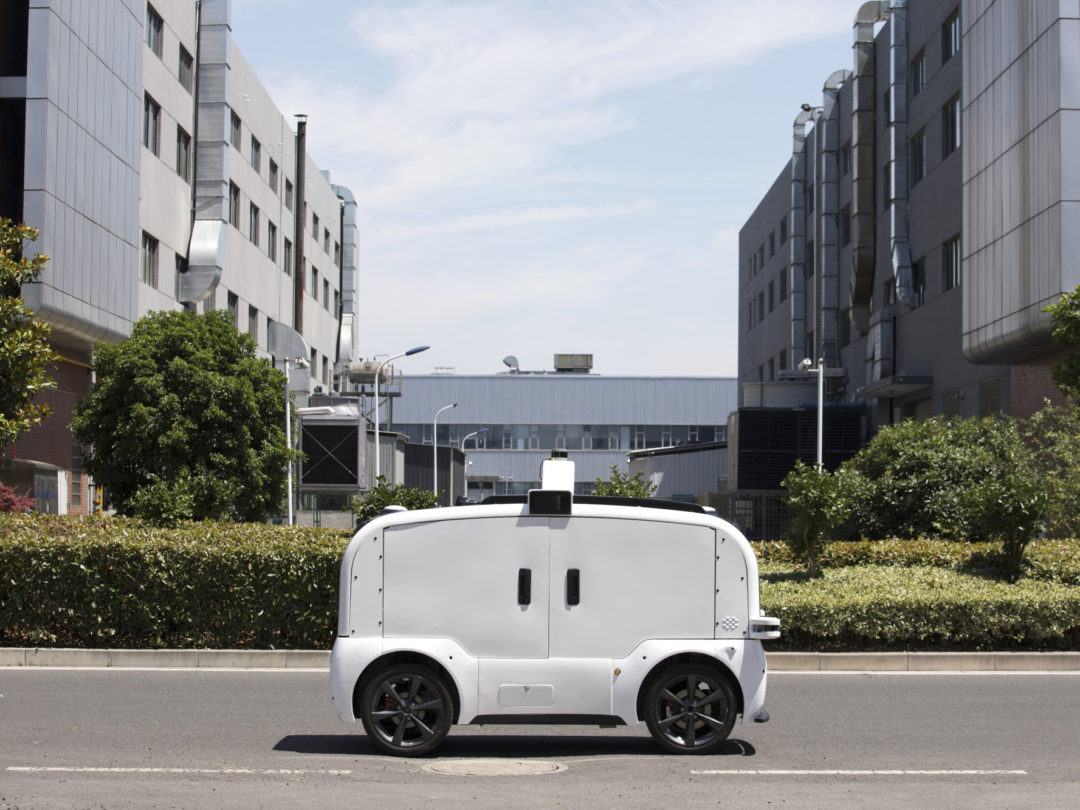
Think Tank
To Save the Supply Chain, Send in the Robotrucks

The COVID-19 pandemic has radically changed how we work. Video chats, e-mail, and teleconferences are keeping many of us on the job, but technological tools can’t protect every business from the negative effects of mandated stay-at-home orders and social distancing protocols.
This is especially true for production facilities, warehouses, logistics, and other industries that make or move things — businesses that might not be able to operate virtually. Many of these companies could soon face an existential choice: shut down or find a way to adapt to our new socially distanced world.
Delivery and transportation services, now more important than ever, are already adjusting their operations to comply with guidelines aimed to reduce the COVID-19 risk to their drivers and delivery personnel. And while mask requirements and rules minimizing human contact are a solid first step, automated vehicle technology could be key to protecting this vital link in the global supply chain.
Industry in the U.S. has been moving toward increased automation for years. In fact, modern warehouses already use autonomous technologies to move goods. Automated forklifts and other vehicles are becoming more common in distribution yards and other facilities. In the coming months and beyond, more industrial workers might find themselves with autonomous robot co-workers.
Automated trucks can take automated technology even further, transporting goods within or between facilities, with reduced human-to-human contact.
The COVID-19 pandemic has highlighted both the importance and vulnerability of the U.S. trucking industry. Seventy percent of all freight tonnage is moved on the nation’s highways, and driver shortages are a problem for the entire supply chain.
Even before the pandemic, the number of truck drivers on the roads was insufficient to meet the industry’s needs, and that supply gap is only expected to grow as the industry struggles to replace retiring truckers and recruit more diverse drivers, including women. Some of these challenges were captured in a study last year by the American Trucking Associations.
Thankfully, there’s a growing set of automated solutions, including platooning (wirelessly linking a convoy of trucks), remote operation (with a driver outside the truck), and even full automation (with no driver required), to allow more goods to be shipped faster and with less labor. This technology is proven and ready to roll. Not only can it help expand freight capacity, but it can also enhance quality of life for individual drivers, by relieving them of tedious or physically taxing portions of routes. What’s more, in the current pandemic, increased automation can put fewer people in harm’s way during a pandemic that threatens to drag on for months, if not longer.
The Federal Motor Carrier Safety Administration, which regulates the interstate trucking industry, has been generally supportive of vehicle automation in commercial vehicles, and is considering ways to adapt its regulations to allow for trucks that have no human driver present in the vehicle.
Currently there is no national standard regarding how companies should build automated trucks or operate them across state lines. As a result, automated truck developers could face state and local regulatory roadblocks. The issue is evident in California, the home base of many automation startups, as well as host to many of the nation’s busiest freight corridors.
Companies in the Golden State have some leeway to adopt automated technologies in controlled environments, such as warehouses and private lots. However, California requires manufacturers testing or operating autonomous vehicles on public roadways to obtain a permit from the Department of Motor Vehicles. And although the DMV is issuing permits for the deployment of some types of light-duty automated trucks, weight limits and interstate operating restrictions can stand in the way.
To the extent California doesn’t allow testing and operation of automated heavier or long-haul trucks, the state may be closing off trucking routes that could otherwise be automated, including routes leading eastward into other states. These regulatory burdens on California’s homegrown entrepreneurs could push automated trucking companies to relocate to other jurisdictions, taking promising job growth with them.
Beyond California, some states limit automated vehicle operation to permit holders or approved “pilot programs.” Others such as Arizona require operators to submit statements certifying compliance with specific safety requirements.
Conflicting state-by-state rules on who can test or operate an automated vehicle, and under what circumstances, can ultimately affect which trucking routes could take advantage of automation in the near future. Some routes that could be prime candidates for automation could instead become non-viable if portions of the route run through a jurisdiction with more restrictive rules. And the patchwork of state regulations can create difficulties and delays, as companies must parse out different rules to determine if their planned operations risk non-compliance.
The trucking industry is the lifeblood of U.S. interstate commerce. Even though this is a challenging time for every industry, challenges provide opportunities for innovation.
Now is the time for increased adoption of automation that could boost freight capacity while reducing delivery delays and burdens on human drivers. Legislators and regulators should recognize the immediate benefits that vehicle automation can have in critical supply-chain infrastructure, and consider ways to enable and promote the use of automation technologies. However, with our political leaders currently focused on addressing immediate COVID-19 concerns, it’s essential for automation companies to help lead the way by creating best practices and industry standards for automated trucking.
Adding automation to the nation’s trucking fleet will help strengthen our nation’s supply chain, during this pandemic and beyond.
Jason Orr is an attorney with O’Melveny & Myers LLP.






